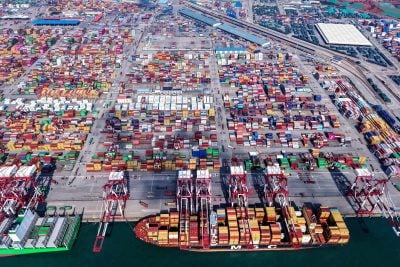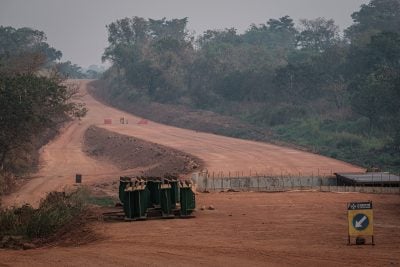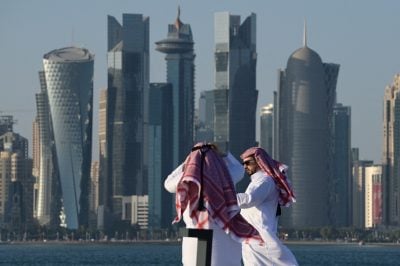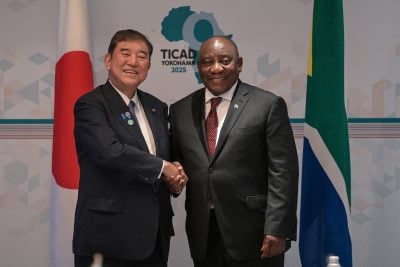Kenya’s upcoming presidential election might mark the seventh time its citizens have expressed their views at the ballot box, but polls in the East African powerhouse still make the international community wince.
With August’s election already a tense two-horse race between deputy president William Ruto and former political prisoner and veteran presidential candidate Raila Odinga, onlookers hope to avoid a repeat of 2007, when a disputed result saw bloody battles in the streets and at least 1,100 people killed.
Beyond hopes for a peaceful democratic process, however, Kenya’s election will dictate how the country’s stuttering economy rebuilds after the ruinous coronavirus pandemic.
Taking place in the region’s most stable country, with all its economic and diplomatic muscle, it also has profound implications for growth and development across East Africa. Watching closely will be scores of international business giants, from General Electric to Google, which have made Kenya their regional headquarters, and Africa-inclined investors the world over.
Voting along tribal lines
Ultimately, though, economic considerations could play second fiddle to the tribal allegiances that have historically shaped Kenyan elections.
“Voters normally vote along tribal lines,” concedes William, 48, a gardener in Nairobi who is backing Odinga, a fellow member of the Luo tribe, Kenya’s fourth largest. “This is the seventh time Kenyans have had the opportunity to vote. Since then, Luos have been voting for one man.”
Hardened by decades in Kenyan politics and familiar with these realities, both Odinga and Ruto have selected running mates from the country’s largest tribe, the Kikuyu, which has produced three of Kenya’s four presidents, including incumbent Uhuru Kenyatta, and have drawn various parties into their ever-growing coalitions.
Could outsider candidates upset Kenya’s election?
In a recent survey across 17 Nairobi constituencies, polling agency Trends for Insights Africa (TIFA) found that presidential candidate Professor George Wajackoyah, who supports the legalisation of cannabis in Kenya, had an approval rating of 7%.
Along with David Mwaure Waihiga from the Agano Party, he is one of the outsiders running for president in the August election. Wajackoyah’s 7% could translate into 150,000 votes if replicated nationwide on polling day, not enough to elect him but enough to affect the result if the race between Ruto and Odinga is close.
If one of the two frontrunners does not secure 50% of the national vote on August 9, the election will be forced into a second round. If Ruto and Odinga are neck and neck, a small number of votes for the two other candidates could be decisive in denying either of them a majority.
Read more:
Shifting allegiances
Whatever the result, 9 August promises to end years of dysfunction in Kenyan politics, during which the deputy president has acted as the government’s primary opposition. Ruto, 54, was initially chosen as Kenyatta’s successor, but found himself on the outside after a 2018 pact, sealed with an infamous handshake, between Kenyatta and Odinga, 77, a former electoral arch-rival.
The pact ended the violence that followed the 2017 election when Kenyatta pipped Odinga to the presidency. Kenyans hoped it would end repeated cycles of post-election violence. Today, Kenya’s president is backing his former opponent against Ruto, who sits beside him at the cabinet table.
Ruto, in turn, has pitched himself as an outsider determined on taking power from the “dynasties” – both Kenyatta and Odinga come from powerful political families – and standing up for the “hustlers”, from market sellers to Kenya’s army of entrepreneurial motorcycle riders, or boda bodas.
William Ruto, champion of the “hustler nation”
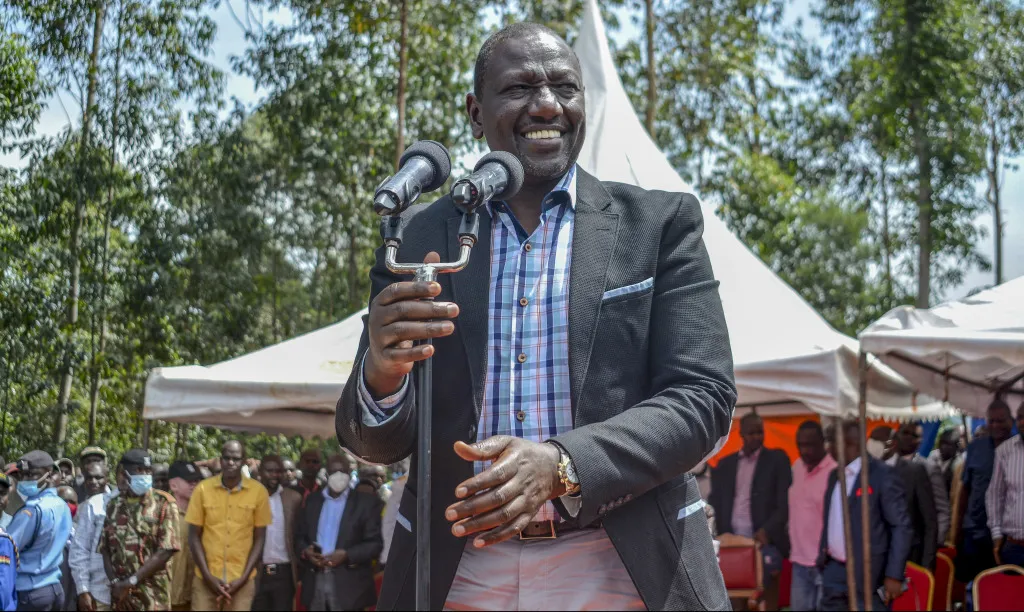
In contrast with the establishment families that dominate the country’s political landscape, Ruto comes from a poorer background, famously not getting his first pair of shoes until the age of 15 and working by selling chickens to passing motorists.
Ruto has sought to present himself as a man of the people, donating gifts such as handcarts and wheelbarrows to the unemployed on the campaign trail. Huge crowds have gathered to hear him speak as he promotes his image as the one leader who can represent the needs of hustlers – those struggling to make ends meet – against the establishment.
In common with many other leading Kenyan politicians, he has moved between different parties over the course of his political career. In 1992, Ruto joined the youth wing of the Kenya African National Union (KANU), which used to dominate the political system, and first entered parliament in 1997 at the age of 30. He went on to support his main opponent in this year’s election, Odinga, at the 2007 polls.
Ruto was rejected by the Jubilee Party as its Presidential candidate for the 2022 election, so last year he joined the United Democratic Alliance (UDA), becoming the official candidate of the 12-party Kenya Kwanza coalition, of which the UDA is part. There have been corruption allegations surrounding the main candidates, including questions over the legitimacy of some of Ruto’s assets. For his part, he insists that he has worked hard for everything he owns.
Ruto says that he will accept the result of the election whichever way it goes, although he also insists that government officials and the media are biased against him. In early June, he told a meeting of European ambassadors that he believed that a million voters had been removed from the electoral roll by the Independent Electoral and Boundaries Commission (IEBC) in areas that are expected to back him.
(Abridged from “Kenya elections: Ruto, man of the people, vs Odinga, king-in-waiting” by Neil Ford in our sister publication New African)
Ruto’s running mate Rigathi Gachagua, a businessman and former assistant to Kenyatta, will, the deputy president hopes, excite poorer voters in vote-rich Mount Kenya. Gachagua is currently facing corruption charges, which he vehemently denies.
It might just work in a country scarred by the economic impact of the coronavirus pandemic. In Turkana county in northwestern Kenya, Samuel, a driver in his early 40s, says he would be casting his ballot for Ruto, “because I’m a hustler too”.
After making peace with Odinga, Kenyatta was able to pass his Building Bridges Initiative – a controversial constitutional amendment he said would promote power sharing – but it was struck down by Kenya’s courts.
Ruto said the amendment, which would have created several new positions, including prime minister, another deputy president, a judicial ombudsman and an official leader of the opposition, would establish an “imperial president” with his thumb on the judiciary and legislature.
Raila Odinga – fifth time lucky?

Odinga is to contest his fifth presidential election as the candidate of the Azimio la Umoja coalition of 26 parties, including the two biggest parties: Odinga’s own Orange Democratic Movement (ODM) and Kenyatta’s Jubilee Party. Odinga has switched party allegiance many times, joining nine different parties or coalitions in the 13 years after 1992, but has been a member of the ODM since 2005.
He is the son of Kenya’s first vice-president, Jaramogi Oginga Odinga, who served under Uhuru Kenyatta’s father, Jomo. He qualified as a mechanical engineer in the former East Germany and briefly lectured at the University of Nairobi before entering politics. He was jailed for six years on charges of participating in the failed 1982 coup and has been imprisoned on other occasions for campaigning for greater political freedoms.
Odinga has various business interests, mostly in relation to importing fuel and manufacturing gas cylinders. As with most other political heavyweights, he has been implicated in corruption scandals but nothing has been proved against him and with social media running amok with conspiracy theories, it is impossible to separate the totally false from the probable truth.
Abridged from “Kenya elections: Ruto, man of the people, vs Odinga, king-in-waiting” by Neil Ford in our sister publication New African)
Odinga hopes his running mate, Martha Karua, a former justice minister and fearless women’s rights campaigner known as the Iron Lady, will lead him to victory through Mount Kenya and inspire the nation’s women to back him on election day. She is the first woman to figure on a major party ticket in Kenya.
Painful history of electoral conflict
The Ruto-Kenyatta row taps into a painful history in East Africa’s most successful country. Both men were indicted by the International Criminal Court on charges of crimes against humanity, which they denied, related to post-election violence in 2007. In 2016 the case fell apart due to a lack of evidence. One year later, during the 2017 election, dozens were killed.
A recent poll by TIFA, a polling firm, found Ruto’s Kenya Kwanza Alliance and Odinga’s Azimio la Umoja One Kenya Coalition neck and neck, with the latter holding a slim lead.
“With so many Kenyans still undecided about their eventual presidential choice, or even if they will in fact vote, the outcome of this contest remains highly uncertain,” TIFA noted.
Experts fear that rampant disinformation on social media platforms could emerge, pitting different ethnic groups against one another. Meanwhile, major international partners have stayed neutral. Both Odinga and Ruto have recently taken identical trips to the UK and US to meet officials.
Economy takes centre stage
Whoever wins will inherit a troubled economy and a dissatisfied population facing a perfect storm of Covid-19, drought and the Ukraine war, which has hit fuel, food and fertiliser supply and worsened an acute hunger crisis in East Africa.
Some 90% of the wheat consumed in Kenya, used to make the daily food staple ugali, is imported from Russia and Ukraine, according to the African country’s Agriculture and Food Authority.
“The election is not going to be determined on the basis of any other critical issue other than the economy,” says Javas Bigambo, a Kenyan political analyst. “Any presidential contender who will not prioritise deliberations on the economy will have himself to blame.”
From rising costs of commodities, even prior to the coronavirus pandemic, to monopolisation, he says, “people are struggling to survive.”
East Africa’s biggest economy grew at 4.7% on average annually between 2015 and 2019, but was hit hard by Covid-19, which disrupted trade and transport and put the pivotal tourism sector on life support.
It was thanks to a resilient agriculture sector, analysts say, that the contraction in GDP was limited to 0.3%. That sector is now in the doldrums, though, amid a drop off in fertiliser supply.
The economy bounced back well last year, growing by 7.5%, according to the 2022 Kenya Economic Survey, but growth will fall to around 5% this year due to food and fuel inflation and poor performance by Kenya’s currency.
With costs rising, many Kenyans are turning to savings and loans – easily accessible using Kenya’s world-beating mobile-money system – while others are falling into poverty. In northern counties, a severe drought has killed livestock and spurred ethnic conflict.
“The economic outlook of this country is nothing to write home about,” says Bigambo.
Both Ruto and Odinga have vowed to usher in double-digit growth. “The economy should be growing by 10% and I will meet the target by ensuring there is ease of doing business in the country,” Odinga said at a thumping campaign rally in Mount Kenya region.
Election year headwinds
The election itself could, however, make matters worse.
“Historically, Kenya tends to record lower economic growth in an election year. During the 2017 elections, real GDP growth slowed by 0.4% to 3.8%, and in 2013, it slipped by 0.8% to 3.8%,” says Shani Smit, an economist at Oxford Economics Africa.
“Meanwhile, investors tend to postpone major investment decisions due to the rise in both political and economic uncertainty amid elections.”
Some ordinary Kenyans have decided to stockpile supplies fearing post-election violence, hitting supply and driving prices up further in rural areas.
With numerous headwinds facing Kenya, Smit predicts a particularly tricky year for the embattled economy.
“We forecast softer economic growth, a spike in consumer price inflation, a wider current account deficit, and a decline in gross foreign reserves in 2022. We also project gross government debt – about 75% of GDP – to remain elevated in 2022 and for the fiscal deficit to remain wide in the run-up to the elections.”
Previous campaigns have, she adds, been characterised by higher debt levels, reduced revenues and falling interest from risk-averse investors.
While unemployment remains a problem, around a million Kenyans under 35 are joining the labour force each year, according to the World Bank. Ruto, vowing to support the “hustlers”, has promised a Ksh100m fund for “vegetable sellers, cart pushers and others at the bottom of the economic ladder”, while Odinga has promised a Ksh6,000 monthly stipend to the poor and unemployed.
Experts say both frontrunners should crack down on graft, with Kenya finding itself 137th out of 180 countries in the Corruption Perception Index from Transparency International.
Will election law favour Odinga?
For now Kenyan newspapers bulge with palace intrigue and political wrangling. A new election law, which allows for the creation of powerful cross-party coalitions, should favour Odinga, analysts say, although he recently lost a coalition ally in Wiper party leader Kalonzo Musyoka. In December, the law led to a brawl in Kenya’s parliament.
Bigambo says disputes among politicians are an unhelpful distraction. Today, he says, Kenya’s political class seem less focused on “managing the economy for the greater good” than “the issue of managing succession”.
“From 2017 we have observed the public spats between the president and his deputy as well as their allies, we have seen outright disrespect for one another,” he says. “All this has made the governance of this administration in the second term an eye-sore.”
Additional research by Charles Dietz. Updated on 29 June 2022.
Want to continue reading? Subscribe today.
You've read all your free articles for this month! Subscribe now to enjoy full access to our content.
Digital Monthly
£8.00 / month
Receive full unlimited access to our articles, opinions, podcasts and more.
Digital Yearly
£70.00 / year
Our best value offer - save £26 and gain access to all of our digital content for an entire year!

 Sign in with Google
Sign in with Google 


